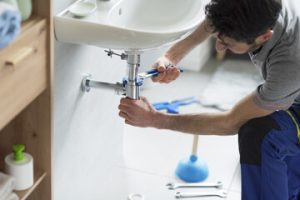There are many benefits of routine plumbing maintenance. These include reduced water waste (a single dripping faucet can waste more than 300 gallons of water annually), energy savings, and improved home comfort.
Minerals and other debris can build up in pipes, resulting in blockages or leaks. Regular inspections can prevent these problems from escalating, saving you costly repairs and replacements. Read on to Find Out More.

Reduced Risk of Damage
Plumbing emergencies, such as burst pipes or severe clogs, are not only stressful but often come with expensive repair bills. Routine maintenance helps to minimize these risks by identifying and addressing minor issues before they escalate, thus saving homeowners both time and money.
A regularly maintained plumbing system also conserves water, helping to reduce environmental waste and utility costs. For example, a single dripping faucet can waste over 3,000 gallons of water per year, while regular inspections allow licensed plumbers to identify and correct this problem before it becomes an issue.
Consistent plumbing maintenance also helps to improve system efficiency, leading to reduced energy consumption. For instance, routine inspections can identify and remove debris from drains, which allows for improved flow of water and prevents blockages. This, in turn, leads to lower utility bills and a more comfortable living space.
For businesses, such as restaurants or hospitals, regular plumbing maintenance ensures compliance with industry health and safety standards. For instance, a clogged drain can lead to unsanitary conditions and food or water contamination, which may result in fines or closure. Similarly, an untreated leak can create an environment that encourages mold growth, which poses health concerns for staff and visitors. By maintaining a healthy plumbing system through routine inspections, businesses can reduce the risk of these issues and provide a safe and secure working environment.
Reduced Utility Bills
Plumbing emergencies like leaky pipes and clogged drains are not only stressful but also often come with hefty repair bills. Regular inspections help nip these problems in the bud, saving you from costly repairs down the road.
Minor issues like frayed seals or corrosion can turn into major water damage if left untreated, but routine inspections identify these concerns early on and provide timely repairs. Aside from preventing expensive repair costs, consistent maintenance helps your home or business run more efficiently. For instance, identifying and repairing leaks cuts down on water waste while addressing inefficient appliances like toilets ensures your household consumes less energy.
Poor water pressure is a common issue caused by clogged pipes or sediment buildup, but foresight and consistent plumbing maintenance can prevent this problem from occurring in the first place. Consistent cleaning and inspections help maintain optimal water pressure so you can get the most out of your everyday tasks like washing dishes, showering, and cleaning.
In commercial settings, consistent plumbing maintenance helps businesses save money on energy bills while maintaining operational efficiency. By detecting and repairing inefficient plumbing systems, these companies can reduce energy consumption while improving the performance of appliances like refrigerators, dishwashers, and washers. As a result, these savings add up over time. In addition, businesses with documented plumbing maintenance can attract buyers, resulting in a higher resale value.
Reduced Risk of Unexpected Issues
Ignoring plumbing issues, such as leaks or clogged drains, can be costlier in the long run. These problems can escalate into major catastrophes that result in costly damage to your property and personal possessions. Routine maintenance and inspections allow licensed plumbers to catch these problems early and repair them before they worsen.
In addition, a well-maintained plumbing system operates more efficiently. Inefficient systems use more energy to operate, resulting in higher utility bills. Regular maintenance includes clearing minor clogs, optimizing water pressure, and more. This can help you save on your utility bill and conserve a precious resource.
Neglected plumbing problems also pose health and safety risks for you and your family or tenants. If left unchecked, they can lead to mold growth, structural damage, and even potential hazards like sewage backups. Getting regular maintenance ensures that these issues are addressed promptly, so they don’t worsen and cause expensive damage or discomfort.
Whether it’s identifying a small leak, preventing clogs or overflows, or extending the life of your pipes and fixtures, routine plumbing maintenance offers many financial benefits for homeowners and commercial property owners alike. By reducing the risk of unexpected issues, improving energy efficiency, and protecting your property’s value, it’s easy to see why so many choose to invest in routine plumbing maintenance!
Increased Home Value
A major issue, like a leak or clog, if not addressed promptly, can result in extensive property damage. It can also affect the health of household members and occupants, posing threats to their safety. As such, consistent plumbing maintenance plays a crucial role in safeguarding the health and safety of residents, preserving the structural integrity of properties, and boosting resale value.
A well-maintained plumbing system is less prone to breakdowns and more efficient in its use of water. For instance, a dripping faucet or a running toilet might not seem like a big deal, but it can waste gallons of water over time, leading to increased utility bills. On the other hand, routine inspections and cleaning can identify inefficiencies, allowing for affordable repairs that reduce monthly expenses.
Plumbing maintenance also ensures that fixtures and appliances last longer. It involves regularly checking pipes for corrosion, addressing issues that might cause clogs or backflows, and cleaning drain lines to prevent blockages. This translates to lower repair costs and less frequent replacement of parts. It also enhances the functionality and performance of fixtures, allowing them to work more efficiently, further saving on energy bills.